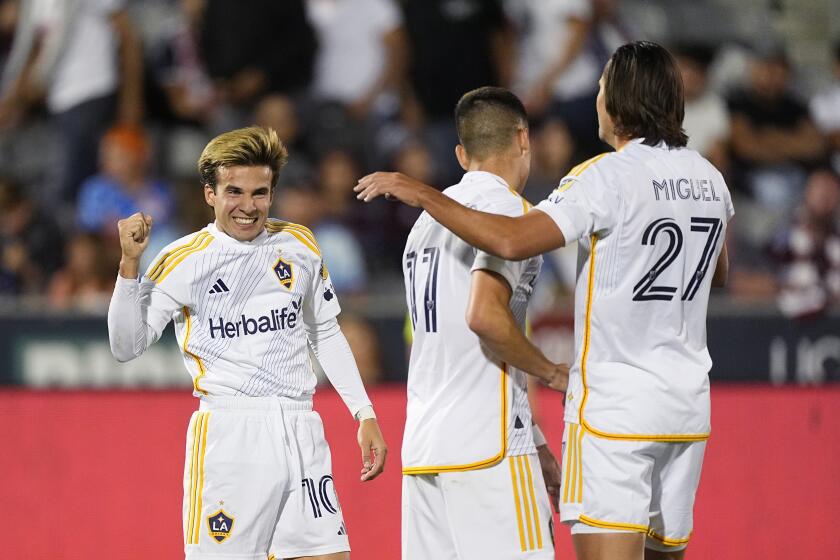One cup to rouse them all
Reporting from Cairo — It was sweet to be an American on that hot afternoon beneath the palms.
For the 90 minutes when the U.S. soccer team recently played Algeria in the World Cup, two Americans in a Cairo cafe received thumbs up and smiles. Not because they were particularly endearing, but at that moment their team was on its way to defeating Egypt’s archrival, a nemesis whose mention draws clenched teeth and bitterness.
Algeria had months earlier knocked Egypt out during the World Cup qualifiers, so it was only natural that the Egyptians, who on most days aren’t enamored with the U.S., would cheer for an American victory in South Africa. Or, more succinctly, an Algerian defeat. The Yanks came through, although this being summer in Egypt, the electricity died and TV screens went blank. Waiters bit their lips and apologized. No one in the cafe saw the winning goal but a cheer rose in the distance around a man listening to a radio.
The U.S. was vanquished by Ghana in the next round. The finals will be played Sunday between the Netherlands and Spain. The victor’s cup will be raised, players will hug and weep. Then, as happens every four years, flags will be furled, face-paint scrubbed, T-shirts folded away with ticket stubs and joy diminished as the world forgets about a beautiful game on a green pitch and tends to war, recession, poverty and unnamed, but lurking calamities.
The World Cup marks our patriotism and national idiosyncrasies but celebrates our sameness. It is an escape into the planet’s best image of itself. It makes the Super Bowl look like what the French might call petite. The drama of a ball arcing in a blur toward a net, a child’s passion played by men in daylight and beneath the moon and stars. It’s a pity it doesn’t last more than a month.
When your nation is eliminated you may switch to another one, memorizing strange sounding surnames, buying new flags and reviewing strategies and statistics the way you pour over stock market tickers. You speak as if you know what you’re talking about. This is not to suggest that you are shallow or a fair-weather fan, unpatriotic. It’s just that you don’t want the anticipation to end, you want to cheer for something larger than yourself.
A friend from Canada, which had no team in the running, switched from underdog to underdog, hoping, perhaps, that soccer can be kinder than geo-politics to impoverished countries whose teams inspire their people more than their presidents and prime ministers. But the fan from Argentina, whose team many predicted as a favorite, left heartbroken after Germany kept knocking goals into the net. 4-0. Ouch, and a plane ride home.
Cruel. But the world can be an unforgiving place, even among cheers and those blaring South African horns. I recall the 1998 World Cup when guns and mortars quieted across Kosovo as the Serb Army and ethnic-Albanian guerrillas laid down their weapons to watch the big matches. A strange cycle: 90 minutes of peace, more war, and on and on. How many lives spared because of a game?
In the bar down the road from the cafe, police linger. Behind courtyard walls, Western expats drink beer while upstairs, demurely, and ever so discreetly, prostitutes from Sudan whisper prices. The game brings everyone together, rich and poor, in harsh ways and not. That is the beauty and sin of nations, of people.
As the World Cup got underway, protests erupted in Egypt over the death of a young man in police custody. Authorities claimed the victim died after attempting to swallow a bag of drugs, but his battered face appeared on placards and became too haunting to ignore. Two policemen were arrested. U.S. Secretary of State Hillary Rodham Clinton later spoke of Egypt’s poor human rights record. Over the last year, however, Washington has cut funding by about 50% to Egyptian groups fighting for democratic reform. A goal denied. America eyed with suspicion.
There was no ill-will, though, when the U.S. played Algeria on that searing afternoon. Cafe fans blew breezes through the palms, waiters rushed and men in tunics stoked shisha pipes, moving with tongs and embers amid white wisps of smoke. TVs were big and the strategically placed. The shade offered repose. The match began; the first half full of adrenalin and promise.
The second half started at 0-0. Play grew furious. The waiter brought an iced tea and an extra-spicy Virgin Mary. The power went out, the sweat rolled. A collective sigh, but patience, in Egypt one must have patience. The play went uninterrupted thousands of miles away, but the TV screens in the cafe were a lifeless gray. A cheer rose from down the street.
A man walked past, his thumbs raised.
“‘Mereeca 1-0.”
A few more minutes ticked by. Another man appeared.
“‘Mereeca won. Algeria finished. Very good.”
The TV screens stayed blank, but somehow, if only for a moment, it all seemed okay.







